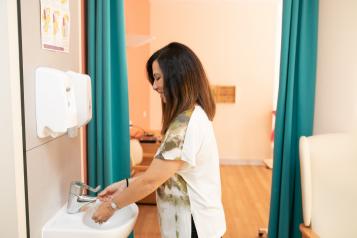Planning care at the end of life

Whilst this can be a difficult conversation, planning can help you express your wishes, helping your family and professionals make decisions about your care if you are unable to.
The NHS reminded health professionals this week that they should provide care in a way that achieves dignity and compassion for everyone equally. This means that every person is treated as an individual, whose needs and preferences should be considered – and an Advance Care Plan can ensure this happens.
Healthwatch England has explained what an Advance Care Plan is, how you can create one, and where to find other resources, based on guidance from the NHS, National Institute for Health and Care Excellence (NICE), as well as Marie Curie and Dying Matters.
NHS policy on “do not attempt to resuscitate” (DNAR) forms
What should normally happen?
It is important for people approaching the end of their lives, or at those at increased risk of death due to their medical circumstances, to discuss their care wishes with their family members, carers and clinicians. This is often known as Advance Care Planning.
Advance Care Planning is likely to involve a discussion about the risks and potential benefits of attempting cardiopulmonary resuscitation (CPR), particularly for people at increased risk of cardiac or respiratory arrest. This is because whilst CPR can be lifesaving, it has a low success rate and, even when successful, can lead to severe complications and reduced quality of life.
It is not uncommon for people to agree to a DNAR, which means clinicians will not administer CPR. However, as is made clear in the GMC’s guidance, the completion of a DNAR must always be discussed with the patient (or their representative) and in a sensitive manner.
If a patient is at risk but does not wish to discuss their preferences or lacks capacity to do so, discussion with those close to the patient must be used to guide a decision in the patient’s best interests.
The current situation
Healthwatch England is not aware of any significant recent or proposed changes to end of life care policy in relation to the COVID-19 situation. This includes no changes to current guidance on CPR or DNARs.
However, it is understandable that given the increased risk of severe respiratory issues due to COVID-19, services are increasingly promoting Advance Care Planning, including discussing DNARs with patients. This is to ensure people’s wishes are known in case their circumstance changes quickly. This is particularly important where family members are involved, as the current rules around social isolation make this more challenging.
It is worth noting that the decision to withhold CPR is a clinical one in the final instance. If a discussion takes place between a doctor and patient, and a patient does not consent to a DNAR, this does not mean a doctor is legally bound to administer CPR, though patients can request a second opinion. Doctors do not legally require a DNAR to withhold CPR in cases where it has no realistic prospect of success.
Clarifying current misinterpretations
Recent media stories have highlighted examples of GP practices and CCGs acting inappropriately and insensitively by asking patients to sign DNAR forms via a letter without prior consultation. This clearly goes against current guidance.
NHS England has now written to all parts of the system to reiterate that such action is not appropriate and stress that at no point should ‘blanket policies’ be used to apply DNARs to any group of patients. This point has already been made in the joint guidance issued by the BMA, Resuscitation Council UK and the Royal College of Nursing.
CQC joint statement on Advance Care Planning
On Monday 30 March, CQC wrote to adult social care providers and GP practices with a statement prepared with the British Medical Association, Care Provider Alliance and Royal College of General Practitioners. The statement sets out their shared position on the importance of advance care planning being based on the needs of the individual.
Talk to us
Please let us know about your experience of Coronavirus treatment – good or not. We will share this with the service providers to inform their plans as they unfold and help them to continue to deliver good quality care at this time.


